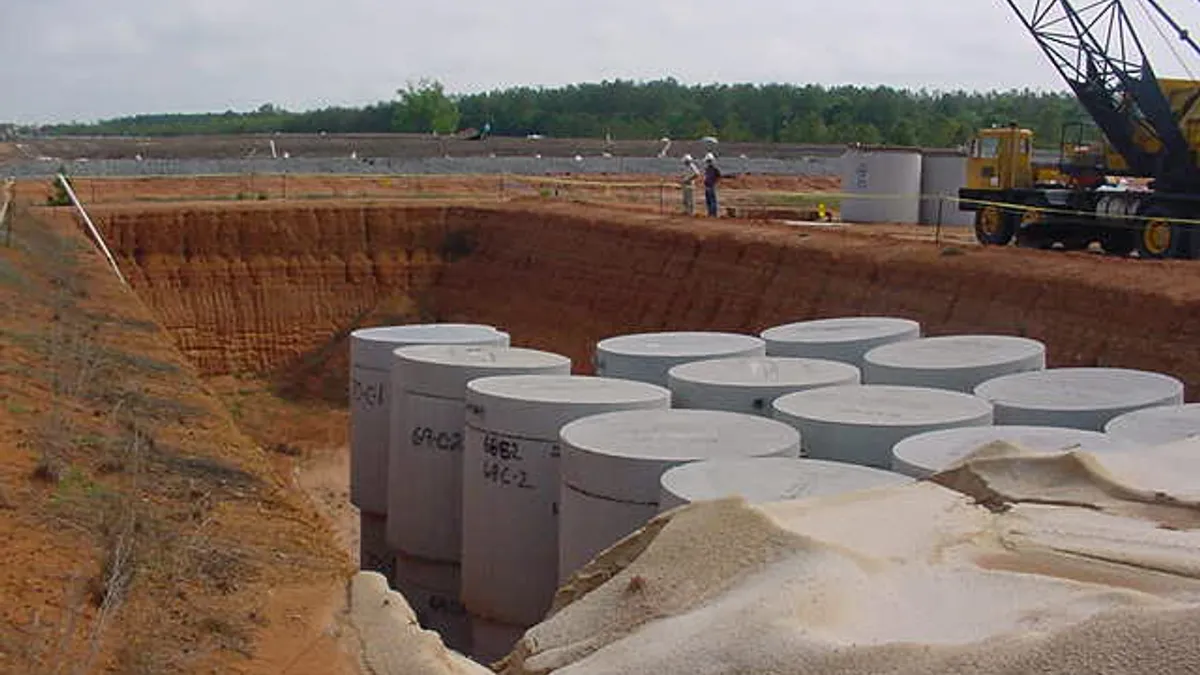Dive Brief:
- The House of Representatives on Thursday passed 340-72 H.R. 3053, sponsored by Rep. John Shimkus, R-Ill., which seeks to restart the process to build a permanent repository for commercial nuclear waste at Yucca Mountain, Nev.
- The bill would also allow the Department of Energy (DOE) to consolidate and store nuclear waste temporarily, as the agency is currently unable to consider interim storage before the development of a permanent repository.
- The legislation has been strongly opposed by the Nevada delegation — Sen. Harry Reid, D-Nev., once referred to the policy to permanently store nuclear waste at Yucca Mountain as the "Screw Nevada bill." Sen. Dean Heller, R-Nev., called H.R. 3053 "dead on arrival in the Senate" in a statement last June.
Dive Insight:
Opposition in the House came mainly from states that would be most impacted by the transportation of nuclear waste to the permanent storage site, led by Nevada representatives. Earlier this month, Rep. Dina Titus, D-Nev., called the bill "Screw Nevada 2.0" when speaking on the House floor.
On Tuesday, the Rules Committee arranged for only one of the amendments from Nevada's representatives to be considered on the floor, from Titus. Her substitute amendment, which was rejected 80-332, sought to establish a consent-based siting process to determine a permanent repository. Consent-based siting would have placed an almost-insurmountable barrier to selecting Yucca Mountain as a permanent storage site.
The House bill had bipartisan backing and supported the buildout of interim nuclear storage, a policy that the Obama administration had also supported. Legislative efforts to reach a conclusion on permanent storage at Yucca Mountain have been stalled time and time again. But the bill has also gained momentum as more nuclear reactors near retirement and commercial nuclear waste accumulates.
The biggest challenge for the bill will be Sen. Heller's block, confirmed Matthew Wald, senior communications adviser for the Nuclear Energy Institute, a trade group. Heller is currently blocking consideration of two Nuclear Regulatory Commission nominees who support Yucca Mountain as a permanent waste repository, according to Roll Call.
As it stands, the DOE is on the hook for a solution to permanent nuclear waste storage. The agency was supposed to begin collecting spent nuclear fuel rods in 1998 and remains responsible for storing them. Nuclear companies had been paying the agency through the Nuclear Waste Fund for the development of a permanent storage site, but the legislative stalls regarding Yucca Mountain have immobilized the DOE.
As a result, the agency is an easy legal target for the nuclear waste storing duties it has failed to perform under contract. Taxpayers pay about $800 million in damages to nuclear companies every year the government does not act, according to an estimate of legal judgments done by NEI.
When looking for the smartest, easiest, most productive solutions, there are better answers than what DOE is currently doing with nuclear waste: "babysitting this stuff in more than 100 different locations," as NEI's Wald put it.
A preferable alternative, according to NEI, would be centralizing interim storage for the spent nuclear fuel, much of which is housed on-site at retired nuclear plants. Interest exists among corporate groups to reprocess the spent nuclear fuel or store it temporarily.
The NRC issued a license in 2006 to Private Fuel Storage, LLC, a nuclear power utility consortium, to build temporary above-ground storage for spent nuclear fuel rods in Utah. The consortium needed approval from additional agencies and the operation never took off, although the NRC license is valid until 2026. Utah regulations ultimately made it very difficult to get fuel to the interim storage site, Wald told Utility Dive.
NRC has received other similar licensing requests, including a 2017 proposal for temporary storage in New Mexico from Holtec International.
Holtec sees the passage of H.R. 3050 as a good step towards interim and long-term solutions for nuclear waste storage.
"We believe this is a critical step for the future of nuclear power, including for innovative new reactors such as our SMR-160," Joy Russell, Holtec's vice president of corporate business development, wrote Utility Dive in an email.















